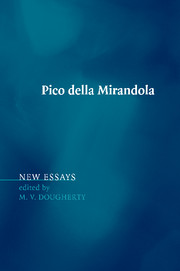Book contents
- Frontmatter
- Contents
- List of Contributors
- Pico della Mirandola
- 1 Introduction
- 2 Pico on the Relationship of Rhetoric and Philosophy
- 3 Pico, Theology, and the Church
- 4 Pico della Mirandola's Philosophy of Religion
- 5 The Birth Day of Venus: Pico as Platonic Exegete in the Commento and the Heptaplus
- 6 Three Precursors to Pico della Mirandola's Roman Disputation and the Question of Human Nature in the Oratio
- 7 Pico on Magic and Astrology
- 8 Pico's Quest for All Knowledge
- 9 A Life in Works
- Index
8 - Pico's Quest for All Knowledge
Published online by Cambridge University Press: 08 February 2010
- Frontmatter
- Contents
- List of Contributors
- Pico della Mirandola
- 1 Introduction
- 2 Pico on the Relationship of Rhetoric and Philosophy
- 3 Pico, Theology, and the Church
- 4 Pico della Mirandola's Philosophy of Religion
- 5 The Birth Day of Venus: Pico as Platonic Exegete in the Commento and the Heptaplus
- 6 Three Precursors to Pico della Mirandola's Roman Disputation and the Question of Human Nature in the Oratio
- 7 Pico on Magic and Astrology
- 8 Pico's Quest for All Knowledge
- 9 A Life in Works
- Index
Summary
Like so much of Pico's thought, his treatment of knowledge has been marked by divergences of interpretation that seem to divide him against himself. On the one hand, there is a minimizing account of Pico on knowledge: as shaped by medieval scholasticism, Pico is ultimately a realist for whom there is no critical problem that requires a distinct “theory of knowledge” to resolve. Indeed, epistemological doctrines are not central to Pico's thought and instead play a secondary role compared to issues bearing on the will and love. On the other hand, there is a maximizing account, according to which Pico makes a momentous contribution by conceiving of all knowledge in symbolic terms and anticipating the course of modern thought. Both of these accounts as classically presented run afoul of the more recent tendency to resist interpretations of the multifarious Pico by resolving his thought into a single organizing principle – unless it be his own theme of showing the harmony of Plato and Aristotle. Perhaps the best way to capture Pico's account of knowledge with the least distortion is to return to its elements, beginning with his treatment of human cognitive powers and examining the cognitive process as it ascends through sensory, rational, intellectual, and divine forms of knowing. By reference to this model of cognition, familiar from the medieval scholastics, Pico's reliance on it as well as his divergence from it will emerge more clearly.
- Type
- Chapter
- Information
- Pico della MirandolaNew Essays, pp. 179 - 201Publisher: Cambridge University PressPrint publication year: 2007
- 3
- Cited by

